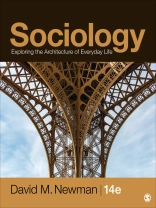In the
Fourteenth Edition of
Sociology: Exploring the Architecture of Everyday Life, David Newman shows students how to see the ‘unfamiliar in the familiar’—to step back and see organization and predictability in their take-for-granted personal experiences. With his approachable writing style and lively anecdotes, the author’s goal from the first edition has been the same: to write a textbook that ‘reads like a real book.’ Many adopters of this book are fans of Peter Berger′s classic works, which helped introduce the idea of ‘social constructionism’ to sociology. Newman uses the metaphors of ‘architecture’ and ‘construction’ to help students understand that society is not something that exists ‘out there, ‘ independently of themselves; it is a human creation that is planned, maintained, or altered by individuals.
Using vivid prose, current examples, and fresh data, this text presents a unique and thought-provoking overview of how society is constructed and experienced. Instead of surveying every subfield in sociology, the more streamlined coverage (14 chapters) focuses on the individual and society, the construction of self and society, and social inequality in the context of social structures.
This title is accompanied by a complete teaching and learning package in
SAGE Vantage, an intuitive learning platform that integrates quality SAGE textbook content with assignable multimedia activities and auto-graded assessments to drive student engagement and ensure accountability. Unparalleled in its ease of use and built for dynamic teaching and learning, Vantage offers customizable LMS integration and best-in-class support.
Inhoudsopgave
Preface to the 14th Edition
Acknowledgments
About the Author
PART I • THE INDIVIDUAL AND SOCIETY
Chapter 1 • Taking a New Look at a Familiar World
Chapter 2 • Seeing and Thinking Sociologically
PART II • THE CONSTRUCTION OF SELF AND SOCIETY
Chapter 3 • Building Reality: The Social Construction of Knowledge
Chapter 4 • Building Order: Culture and History
Chapter 5 • Building Identity: Socialization
Chapter 6 • Supporting Identity: The Presentation of Self
Chapter 7 • Building Social Relationships: Intimacy and Families
Chapter 8 • Constructing Difference: Social Deviance
PART III • SOCIAL STRUCTURE, INSTITUTIONS, AND EVERYDAY LIFE
Chapter 9 • The Structure of Society: Organizations, Social Institutions, and Globalization
Chapter 10 • The Architecture of Stratification: Social Class and Inequality
Chapter 11 • The Architecture of Inequality: Race and Ethnicity
Chapter 12 • The Architecture of Inequality: Sex and Gender
Chapter 13 • Demographic Dynamics: Population Trends
Chapter 14 • Architects of Change: Reconstructing Society
Glossary
References
Index
Over de auteur
David M. Newman earned his BA from San Diego State University in 1981 and his graduate degrees from the University of Washington in Seattle (MA 1984, Ph D 1988). After a year at the University of Connecticut, David taught at De Pauw University for more than 30 years. He currently teaches at Colgate University. David teaches courses in contemporary society, deviance, mental illness, family, social inequality, and research methods. He has published numerous articles on teaching and has presented research papers on the intersection of gender and power in intimate relationships. Recently most of his scholarly activity has been devoted to writing and revising several books, including Sociology: Exploring the Architecture of Everyday Life: Brief Edition (SAGE, 2020); Identities and Inequalities: Exploring the Intersections of Race, Class, Gender, and Sexuality (Mc Graw-Hill, 2021); and Families: A Sociological Perspective (Mc Graw-Hill, 2009). His most recent book, A Culture of Second Chances: The Promise, Practice and Price of Starting Over in Everyday Life (Lexington Books, 2019), examines the cultural meaning, institutional importance, and social limitations of “second chance” and “permanent stigma” narratives in everyday life.












